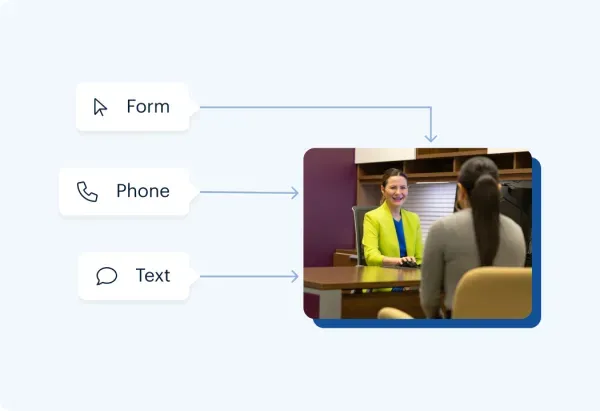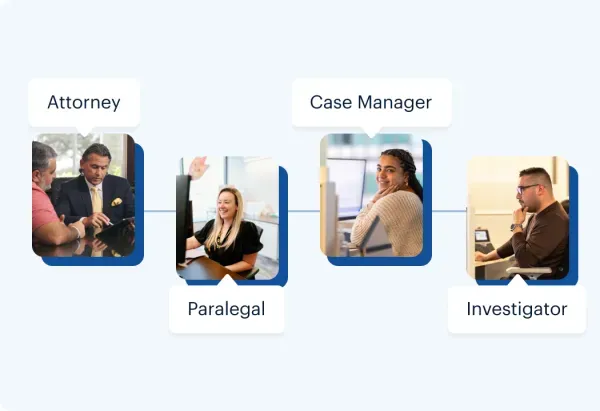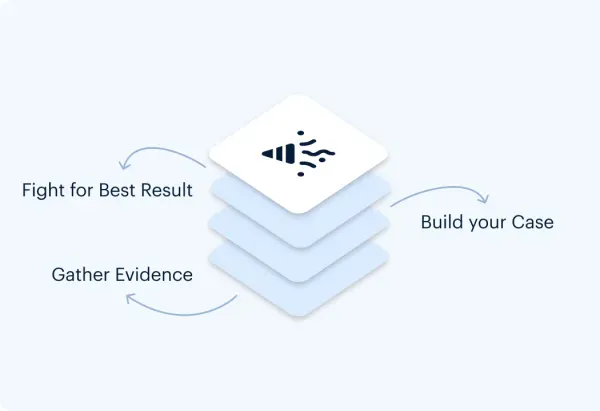Results may vary depending on your particular facts and legal circumstances. The attorney featured above is licensed in Florida. For a full list of attorneys in your state please visit our attorney page.
TEXAS WORKERS' COMPENSATION LAWYERS
Work injuries can turn life upside down. We fight for injured workers to access the medical care and wage support they’re entitled to.
Results may vary depending on your particular facts and legal circumstances. The attorney featured above is licensed in Florida. For a full list of attorneys in your state please visit our attorney page.
Protecting Your Rights After a Workplace Injury in Texas
Suffering an injury on the job can be overwhelming, leaving you unable to work while facing medical bills, rehabilitation costs, and lost income.
In Texas, workers’ compensation provides vital benefits to help injured employees recover, but the claims process can be complex, and insurance companies often deny or delay rightful benefits.
An experienced Texas work injury and workers’ compensation lawyer can help you navigate the system, ensure your claim is properly filed, and advocate for medical care, wage replacement, and other benefits you’re entitled to. They can also handle denials, disputes, and appeals to make sure you receive fair treatment.
A Texas workers’ compensation attorney from Morgan & Morgan can guide you through every step, protect your rights, and fight for the benefits you need to recover. Schedule a free, no-obligation case evaluation through our website. Let us help you focus on healing while we handle the legal fight.
100,000+ Five Star Reviews
The reasons why clients trust Morgan & Morgan.
Results may vary depending on your particular facts and legal circumstances. Based on select nationwide reviews.
Our Results
How It Works
Unsure what to do next? With 35 years of experience, our personal
injury lawyers will guide you every step of the way.

Contact Us 24/7 - It’s Free
Start your claim

Meet your dedicated attorney
Meet the attorneys

We fight for more
Learn more about the case process
Results may vary depending on your particular facts and legal circumstances. The attorneys shown in these photos may not be licensed in your state. To find an attorney licensed in your area, please visit our attorney page.
Local Care
Backed by America’s Largest Injury Law Firm.
$30 Billion
Recovered for clients
nationwide700,000+
Clients and families
served1,000+
Attorneys across
the country1
Click may change your life
The attorney featured above is licensed in Florida. For a full list of attorneys in your state please visit our attorney page.
Results may vary depending on your particular facts and legal circumstances.
In the Community
Discover the local Morgan & Morgan experience with news, events, and partnerships.
Learn More
Injured and not sure what to do next?
We'll guide you through everything you need to know.
Workers' Compensation Insurance Is Not Required in Texas
Almost all states have some type of requirement for workers’ compensation insurance. However, Texas is a bit of an outlier. Employers in Texas are not required to provide workers' compensation insurance. If you work at a company that does not provide this type of insurance, you can opt to purchase your own private injury benefit plan.
If Your Employer Has Workers’ Compensation Insurance
If you’ve been injured at work and your employer has workers’ compensation insurance, take the following steps:
Seek Medical Attention
If you've been injured at work, you may be wondering how to file a workers' compensation claim in Texas. The first thing you should do is seek medical attention for your injuries. You can choose the doctor you wish to see; you do not have to get approval from your employer or the insurance company. However, if you end up not liking the doctor you choose and wish to find a new one, you will have to fill out a form requesting a change.
Notify Employer
Once you've done that, you'll need to notify your employer of the accident and your injuries. You must do this within 30 days, but it’s a good idea to do this as soon as possible. You can do this verbally or in writing, but it's important to make sure that your employer is aware of the situation so that they can begin the claims process. Having written confirmation of this notice is advisable. Your employer should then give you a workers' compensation claim form to fill out and return.
Complete Form-041
After you report your injury, you must complete the Division of Workers’ Compensation (DWC) Form-041 within one year of the date you were injured. You can find the DWC-1 form online at the DWC website or by visiting your local DWC office. Be sure to keep copies of all documents related to your claim for your records. Make sure you follow up after you submit the form to ensure they received it and have all the information required.
Decision
Once your claim has been filed, the DWC will assign it to an insurance agent who will then contact you to set up an appointment for a medical examination. It's important to keep this appointment so that your injury can be properly documented.
After you've seen a doctor, the agent will review your claim and make a determination of whether or not you're eligible for benefits. If your claim is approved, you'll begin receiving benefits based on your average weekly wage. These benefits can include medical expenses, income replacement, and death benefits.
Appeal
If your claim is denied, you have the right to file an appeal. Before filing an appeal, the first step you should take is to speak with your attorney. An experienced attorney can help you navigate the claims process and ensure that your rights are protected every step of the way. They can reach out to the insurance company and discuss why the claim was denied and see if it can be resolved easily. If this isn’t possible, you can decide to begin the dispute resolution process with the DWC by requesting a benefit review conference.
At the benefits review conference, you and your lawyer will have a meeting with someone from the insurance company and a review officer from the DWC to discuss the claim. The goal is to try to resolve the dispute in a way that is acceptable to all parties. If an agreement cannot be reached, you can request a more formal proceeding to dispute the decision—a contested case hearing.
A contested case hearing is held by a DWC administrative law judge. Once the hearing concludes, a decision will be rendered by the judge. This decision can be further appealed if it does not go in your favor. You can either choose arbitration or appeal to have another hearing, where the Appeals Panel reviews your claim.
The Appeals Panel looks at statements, prior decisions, and records from the previous disputes and makes a determination about your claim. If this is still not in your favor, you have one last chance to appeal to the appropriate judicial court.
If No Workers’ Comp, You Will Need to File a Personal Injury Claim for a Work Injury
If you have been injured while at work in Texas and your employer doesn’t have workers’ comp insurance, you may be wondering how you can get compensated. In this case, you will need to file a personal injury claim. To ensure that your claim is successful, it is important to follow the correct steps and procedures. Consider taking the following steps:
Contact a Lawyer
The first step is to contact a personal injury lawyer to discuss your case and learn about your legal options. From there, your lawyer will help you gather evidence to support your claim and file the necessary paperwork with the court.
Evidence to Gather After an Accident
It's important to gather as much evidence as possible after an accident. This may include photos or videos of the accident scene, eyewitness statements, medical records, and more. Your lawyer will use this evidence to build a strong case on your behalf.
Filing the Necessary Paperwork
Once you have gathered all of the necessary evidence, your lawyer will help you file the appropriate paperwork with the court. This paperwork will detail your injuries, damages, and losses. Once the paperwork has been filed, the defendant will be served and the court will set a date for your hearing.
Discovery
Once the complaint is filed, the process of “discovery” begins. This is when both sides exchange information about their cases. This can be done through written questions (interrogatories), requests for documents, and depositions.
If Your Case Goes to Trial
If both sides cannot agree on a settlement, the case will go to trial and your lawyer will litigate your case before a judge or jury. Your lawyer will help you present your evidence and argue why you should be compensated for your injuries. If the judge or jury decides in your favor, they will award you damages. These damages may cover medical expenses, lost wages, pain and suffering, and more.
What if the Injury Was My Fault?
Workers' compensation is a no-fault system, which means that it does not matter who was at fault for the accident. Whether you were injured on the job because of your own negligence or because of a co-worker's or supervisor’s negligence, you will likely be able to receive workers' compensation benefits. However, there are some exceptions to this rule. For instance, if you were injured while engaging in illegal activity, you may not be eligible for benefits.
What Injuries Are Covered by Workers’ Compensation?
If your employer provides workers’ compensation insurance, most personal injuries that are caused while you are performing your job duties are covered under workers' compensation. This includes any illness that is caused by exposure to hazardous materials at work. Some common examples of injuries that are covered under workers' compensation include:
- Slips and falls
- Repetitive motion injuries
- Back injuries
- Carpal tunnel syndrome
- Lost limbs
- Vision loss
- Hearing loss
- Scarring
- Burns
- Poisonings
Workers' compensation will also cover any death that occurs as a result of a workplace accident or exposure to hazardous materials and any surviving loved ones will be compensated.
If you are injured while commuting to or from work, you are not eligible for workers' compensation benefits. The same applies if you are injured while participating in a work-sponsored event that is not required by your employer, such as a company softball game. If you are injured while on a business trip, however, you may be eligible for benefits.
How Do Workers' Compensation Lawyers Get Paid?
In general, lawyers who handle workers' compensation cases work on a contingency basis. This means that they do not charge an upfront fee for their services. Instead, they collect a percentage of the settlement or award that their client receives based on the number of hours they spent on your case. In Texas, the maximum percentage the attorney can charge is 25 percent. Additionally, the lawyer has to calculate the number of hours spent on your claim and cannot charge more than $200 an hour. This doesn’t mean you pay them $200 an hour out of your own pocket. That is how much they can charge and take out of your award. Make sure you speak with your lawyer and you fully understand the fee agreement before signing anything.
Contact Morgan & Morgan For Help
If you have been injured at work, it is important to speak with a workers' compensation lawyer as soon as possible. A lawyer can help you navigate the claims process and ensure that you receive the full benefits to which you are entitled. The Morgan & Morgan Work Injury & Workers' Compensation Lawyers in Texas are experienced in handling workers' compensation claims and can help you get the compensation you need to recover from your injuries. We are familiar with the laws governing workers' compensation claims and will help to ensure that your claim is properly filed and processed.
Contact Morgan & Morgan today for a free consultation.













